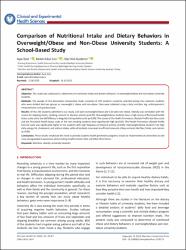Comparison of nutritional intake and dietary behaviors in overweight/obese and non-obese university students: A school-based study
Künye
Dost, A., Esin, M. N. ve Hızlı Güldemir, H. (2021). Comparison of nutritional intake and dietary behaviors in overweight/obese and non-obese university students: A school-based study. Clinical and Experimental Health Sciences, 11(1), 20-27. https://dx.doi.org/10.33808/clinexphealthsci.753179Özet
Objective: This study was conducted to determine of nutritional intake and dietary behaviors in overweight/obese and non-obese university students. Methods: The sample of this descriptive comparative study consisted of 220 students randomly selected among the university students who were divided into two groups as overweight / obese and non-obese. Data were collected using a daily nutrition log, anthropometric measurements and questionnaire. Results: Of the 220 students admitted to our study, 110 were overweight/obese and 110 were non-obese. Obesity was correlated with the reason for skipping meals, smoking, amount of physical activity (p<0.05). Overweight/obese students have a high scores of Perceived Health Status scale and a low Self-Efficacy to Regulate Eating Habits scale (p=0.00). The scores of the Health Promotion Lifestyle Profile Nutrition scale and the Perceived Health Status scale of the non-smoking students were significantly high (p<0.05). The Health Promotion Lifestyle Profile Exercise scale was significantly higher in the students with high frequency of physical activity (p=0.00). Overweight/obese students had high daily energy, fat, cholesterol, and sodium intake, while all students consumed insufficient amounts of key nutrients like fiber, folate, and calcium (p=0.00). Conclusions: These results emphasize the need to provide students health promotion programs should be implemented at universities to and raise young people’s awareness about making healthy choices that will affect their future.
Kaynak
Clinical and Experimental Health SciencesCilt
11Sayı
1Bağlantı
https://dx.doi.org/10.33808/clinexphealthsci.753179https://hdl.handle.net/20.500.12511/10803


















